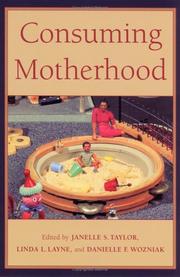| Listing 1 - 10 of 58 | << page >> |
Sort by
|
Book
ISBN: 2724622154 9782724622157 Year: 2018 Publisher: Paris: Presses de sciences po,
Abstract | Keywords | Export | Availability | Bookmark
 Loading...
Loading...Choose an application
- Reference Manager
- EndNote
- RefWorks (Direct export to RefWorks)
Achats bio, boycott, refus de la publicité, éco-villages, véganisme… Multiforme, la consommation engagée fait du marché un lieu de contestation politique contre les excès du capitalisme et de la société d'accumulation. Dès le XVIIIe siècle apparaît l'idée que les citoyens peuvent, en unissant leurs efforts individuels, infléchir les tendances délétères de la société. Depuis, ce mouvement n'a cessé de grandir et d'étendre ses prérogatives. Aux causes de justice sociale se sont désormais ajoutées les luttes contre la dégradation de l’environnement, pour les circuits courts, contre la souffrance animale, pour l'éthique dans les échanges, etc. Critique à la fois contre et dans le marché, avec lequel elle entretient une relation ambiguë, la consommation engagée s’impose aujourd’hui comme un mouvement puissant, capable d’influencer les gouvernements, les législateurs et les acteurs économiques
Consumption (Economics) - Social aspects --- Consumers - Attitudes --- Consumption (Economics) --- Consumers
Book
ISBN: 9780745645407 9780745645414 0745645402 0745645410 Year: 2010 Publisher: Cambridge: Polity press,
Abstract | Keywords | Export | Availability | Bookmark
 Loading...
Loading...Choose an application
- Reference Manager
- EndNote
- RefWorks (Direct export to RefWorks)
Over-consumption is one of the key issues of our time, especially in the Western world. Over the past decade, in the face of historically unprecedented levels of consumer spending in the West - and the more recent impact of recession - a vigorous politics of anti-consumerism has emerged in a range of wealthy nations. This timely and original new book provides a comprehensive overview and analysis of what has come to be called the 'new politics of consumption'; a politics embodied in movements such as culture jamming, simple living, slow food and fair trade. The book offers an examination of anti-consumerism at a time when the idea of 'consumer excess' is being re-framed by a global economic downturn, and crucially explores what this means for the future of political debate. Drawing on interviews with activists across three continents, and offering a refreshingly accessible discussion of contemporary commentary and theory, Kim Humphery sympathetically explores anti-consumerism as cultural interpretation, lifestyle change, and collective action. Whilst analysing the positive advances of the anti-consumerist movement, Excess also challenges contemporary critical thinking on consumption, taking issue with the return to theories of mass culture in contemporary anti-consumerist polemic. Alternatively, Humphery begins to forge a politics of anti-consumerism that addresses the complexity of material acquisition and which avoids treating consumers as mere dupes in the logic of capitalism, viewing them instead as active participants in a culture which is capable of transformation. -- Publisher description.
National consumption --- Consumption (Economics) --- Social aspects. --- Consumption (Economics). --- Social aspects --- Consumption (Economics) - Social aspects
Book
ISBN: 9781137471741 1137471743 Year: 2017 Publisher: London: Palgrave,
Abstract | Keywords | Export | Availability | Bookmark
 Loading...
Loading...Choose an application
- Reference Manager
- EndNote
- RefWorks (Direct export to RefWorks)
Advertising --- Consumption (Economics) --- Social aspects --- Advertising - Social aspects --- Consumption (Economics) - Social aspects
Book
ISSN: 17751802 ISBN: 9782373090680 2373090686 Year: 2020 Publisher: Paris: L'échappée,
Abstract | Keywords | Export | Availability | Bookmark
 Loading...
Loading...Choose an application
- Reference Manager
- EndNote
- RefWorks (Direct export to RefWorks)
Ce livre, résolument à contre-courant, montre comment la contre-culture n'a pas seulement été inefficace dans sa lutte contre le capitalisme, mais comment elle lui a fait faire ses plus grands bonds en avant.
Consumption (Economics) --- Marketing --- Advertising --- Counterculture --- Social aspects --- Contre-culture. --- Consumption (Economics) - Social aspects --- Marketing - Social aspects --- Advertising - Social aspects

ISBN: 0674543564 9780674543560 Year: 1996 Publisher: Cambridge (Mass.) : Harvard university press,
Abstract | Keywords | Export | Availability | Bookmark
 Loading...
Loading...Choose an application
- Reference Manager
- EndNote
- RefWorks (Direct export to RefWorks)
National consumption --- Consumers' preferences --- Consumer behavior --- Consumption (Economics) --- Human capital --- Social aspects --- Consumer behavior. --- Consumers' preferences. --- Human capital. --- Social aspects. --- Consumption (Economics) - Social aspects
Book
ISBN: 9782742777754 274277775X Year: 2008 Publisher: [Nîmes]: Chambon,
Abstract | Keywords | Export | Availability | Bookmark
 Loading...
Loading...Choose an application
- Reference Manager
- EndNote
- RefWorks (Direct export to RefWorks)
Consumption (Economics) --- Consumers' preferences --- Consommation (Economie politique) --- Consommateurs --- Préférences --- Consumers --- Consumer behavior --- Social aspects --- Attitudes --- Préférences --- Consumption (Economics) - Social aspects --- Consumers - Attitudes
Book
ISSN: 19626274 ISBN: 9782724611052 2724611055 Year: 2009 Volume: 5 Publisher: Paris: Presses de sciences po,
Abstract | Keywords | Export | Availability | Bookmark
 Loading...
Loading...Choose an application
- Reference Manager
- EndNote
- RefWorks (Direct export to RefWorks)
Boycott, achat de produits « éthiques », résistance à la publicité ou formes d'échange alternatives, les registres de protestation des consommateurs sont multiples. Quelles lectures peut-on en proposer ? Quel est leur impact sur les marchés et dans la sphère sociale ? Espace de recrutement et de discipline des comportements individuels sur des projets collectifs variés, la consommation engagée dispose d'une réelle capacité à mettre sur l’agenda politique, économique ou médiatique de nouvelles problématiques sociales liées à l’environnement ou à l’éthique dans les échanges.La consommation engagée entretient des relations ambiguës avec le marché, contribuant tout autant à le contester qu’à l'étendre. Toutefois, lorsqu'elle est articulée à des actions collectives, elle n’exprime plus seulement des droits ou des besoins individuels, mais redevient un espace de construction de responsabilités et de devoirs citoyens.
Consumption (Economics) --- Consumers --- Consommation (Economie politique) --- Consommateurs --- Social aspects. --- Attitudes. --- Aspect social --- Attitudes --- Social aspects --- Consommation durable. --- Associations. --- Consumption (Economics) - Social aspects --- Consumers - Attitudes

ISBN: 9780813534305 0813534305 0813534291 Year: 2004 Publisher: New Brunswick (N.J.) : Rutgers university press,
Abstract | Keywords | Export | Availability | Bookmark
 Loading...
Loading...Choose an application
- Reference Manager
- EndNote
- RefWorks (Direct export to RefWorks)
Consuming Motherhood addresses the provocative question of how motherhood and consumption―as ideologies and as patterns of social action―mutually shape and constitute each other in contemporary North American and European social life. Ideologically, motherhood and consumption are often constructed in opposition to each other, with motherhood standing in as a naturalized social relation that is thought to be uniquely free of the calculating instrumentality that dominates commercial relations. Yet, in social life, motherhood and consumption are inseparable. Whether shopping for children’s clothing or childbirth services, or making decisions about adopting children, becoming a mother (and maternal practice more generally) is deeply influenced by consumption. How can the relationship between motherhood and consumption be revealed, and critically analyzed? Consuming Motherhood brings together a group of sociologists, anthropologists, and religious studies scholars to address this question through carefully grounded ethnographic studies. This insightful book reveals how mothers negotiate the contradictory forces that position them as both immune from and the target of consumerist tendencies in contemporary global society.
Motherhood --- Consumption (Economics) --- Women consumers --- Social aspects --- Motherhood. --- Women consumers. --- Social aspects. --- Consumption (Economics) - Social aspects --- Maternité --- Consommation --- Consommatrices --- Aspect social
Book
ISBN: 9780801450044 0801450047 Year: 2011 Publisher: Ithaca (N. Y.): Cornell university press,
Abstract | Keywords | Export | Availability | Bookmark
 Loading...
Loading...Choose an application
- Reference Manager
- EndNote
- RefWorks (Direct export to RefWorks)
Book
ISBN: 9781509531561 9781509531578 9781509531592 1509531599 1509531572 1509531564 Year: 2019 Publisher: Cambridge: Polity press,
Abstract | Keywords | Export | Availability | Bookmark
 Loading...
Loading...Choose an application
- Reference Manager
- EndNote
- RefWorks (Direct export to RefWorks)
'Because you're worth it', proclaims the classic cosmetics ad. 'Just do it!' implores the global sports retailer. Everywhere we turn, we are constantly encouraged to experience as much as possible, for as long as possible, in as many ways as possible. FOMO - Fear of Missing Out - has become a central preoccupation in a world fixated on the never-ending pursuit of gratification and self-fulfilment. But this pursuit can become a treadmill leading nowhere. How can we break out of it? In this refreshing book, bestselling Danish philosopher and psychologist Svend Brinkmann reveals the many virtues of missing out on the constant choices and temptations that dominate our experience-obsessed consumer society. By cultivating self-restraint and celebrating moderation we can develop a more fulfilling way of living that enriches ourselves and our fellow humans and protects the planet we all share - in short, we can discover the joy of missing out.
Moderation. --- Self-control. --- Consumption (Economics) --- Excess (Philosophy) --- Social aspects. --- Gelukkig zijn --- Levenskunst --- stress --- Bee Collection --- Moderation --- Self-control --- Social aspects --- Consumption (Economics) - Social aspects
| Listing 1 - 10 of 58 | << page >> |
Sort by
|

 Search
Search Feedback
Feedback About UniCat
About UniCat  Help
Help News
News